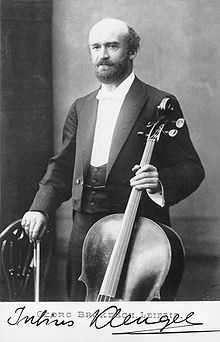Julius Klengel
| Julius Klengel | |
|---|---|
 Julius Klengel (1903) | |
| Background information | |
| Genres | Classical music |
| Occupation(s) | Cellist |
| Instruments |
Cello Piano |
Julius Klengel (24 September 1859 – 27 October 1933) was a German cellist who is most famous for his etudes and solo pieces written for the instrument. He was the brother of Paul Klengel. A member of the Gewandhaus Orchestra at fifteen, he toured extensively throughout Europe as cellist and soloist of the Gewandhaus Quartet. His pupils include Emanuel Feuermann, Gregor Piatigorsky and Alexandre Barjansky.[1] See: List of music students by teacher: G to M#Julius Klengel.
Biography
Born in Leipzig, the son of a lawyer who was a fine amateur musician and a friend of Mendelssohn,[2] Klengel studied with Emil Hegar in his youth. After his 15th birthday, Klengel joined the Leipzig Gewandhaus Orchestra where Hegar played first cello, and began touring in Europe and Russia. Klengel also became a soloist at that point, frequently giving solo performances.
Klengel rose to become principal cellist of the orchestra, aged 22, in 1881.[2] There he remained for over four decades: to celebrate his fifty years of service, Wilhelm Furtwängler conducted a jubilee concert, in which Klengel played the cello part in a double concerto he composed for the occasion. During that time period, Klengel became professor at the Leipzig Conservatory, where he was briefly a member of Adolph Brodsky's string quartet, and began composing. He ultimately composed hundreds of pieces for the cello, including four violoncello concertos, two double cello concertos, cello quartets, a cello sonata, as well as numerous caprices, etudes and other technical pieces. Of his music, the two volumes of etudes ("Technical Studies") for cello remain in the repertory; three concertos were recently recorded by Christoph Richter and NDR Radiophilharmonie under Bjarte Engeset.
His students were Emanuel Feuermann, <ref name =Annette Morreau: Emanuel Feuermann, Yale University Press, 2003 and Seymour W. Itzkoff: Emanuel Feuermann Virtuoso, International Academy of Chamber Music Kronberg, 1979 Guilhermina Suggia, Paul Grümmer, William Pleeth.[3] and Gregor Piatigorsky.[4] He died in October 1933 in his hometown of Leipzig.
Musical works
- Capriccio, Op. 3
- Cello Concerto No.1 in A minor, Op. 4
- Two pieces for four Cellos, Op. 5
- Serenade
- Humoresque
- Scherzo for Cello and Piano, Op. 6
- Concertino No.1 in C major, Op. 7
- Concert piece in D minor for Cello and Piano, Op. 10
- Mazurka No.3 for Cello and Piano, Op.14
- Variations for four Cellos, Op. 15
- Suite in D minor for two Cellos, Op. 22
- Serenade in F major, Op. 24
- Caprice for Cello and Piano, Op. 27
- Theme with Variations for four Cellos, Op. 28
- Impromptu for four Cellos, Op. 30
- Concerto No.3 for Cello, Op. 31
- Four pieces for four Cellos, Op. 33
- Song without words
- Gavotte
- Lullaby
- March
- Piano Trio No.2 (children's), Op. 35
- Kindertrio No.1 in C major
- Kindertrio No.2 in G major
- Concerto No.4 for Cello in B minor Op. 37
- Piano Trio No.1 (children's), Op. 39
- Kindertrio No.1 in F major
- Kindertrio No.2 in D major
- Suite No.2 in A minor for Cello and Piano, Op. 4
- Concertino No.2 in G major for Cello and Piano, Op. 41
- Caprice in the Form of a Chaconne after a Theme by Schuman for solo Cello, Op. 43
- Double Concerto in E minor for two Cellos, Op. 45
- Concertino No.3 in A minor for Cello and Piano, Op. 46
- Six Sonatinas for Cello and Piano, Op. 47
- Six Sonatinas for Cello and piano, Op. 48
- Andante Sostenuto for Cello and Orchestra, Op. 51
- Suite for Cello and Organ, Op. 54
- Suite for Cello in D minor, Op. 56
- Hymnus for 12 Cellos, Op. 57
- Small Suite for three Cellos, Op. 59
- Concerto for Violin, Cello and Orchestra, Op. 61
- Three pieces for two Cellos and Piano (organ), Op. 62
Works without Opus number
- Tägliche Übungen, Vol. I
- Tägliche Übungen, Vol. II
- Tägliche Übungen, Vol. III
Notes
- ↑ Randel, Don Michael (1996). The Harvard Biographical Dictionary of Music. Harvard University Press. p. 452. ISBN 0-674-37299-9.
- ↑ 2.0 2.1 Cello.org. "Julius Klengel". Cello.org. Retrieved 3 December 2011.
- ↑ King, Terry (2010). Gregor Piatigorsky: The Life and Career of the Virtuoso Cellist. McFarland & Co Inc. p. 335. ISBN 0-7864-4635-8.
- ↑ "Gregor Piatigorsky (1903-1976)". The Piatigorsky Foundation. Retrieved 2011-12-12.
External links
|